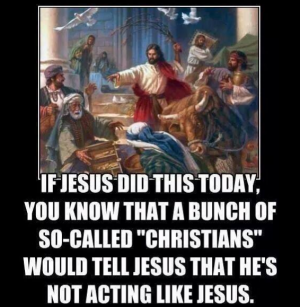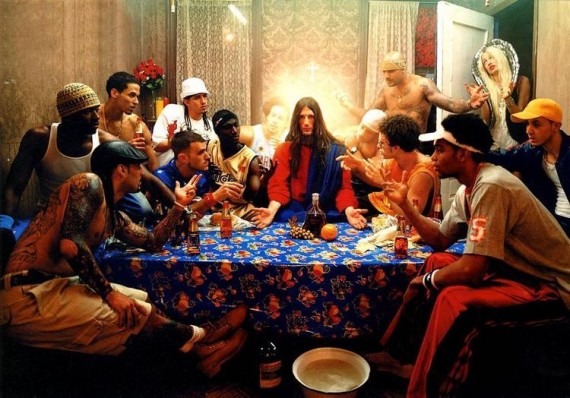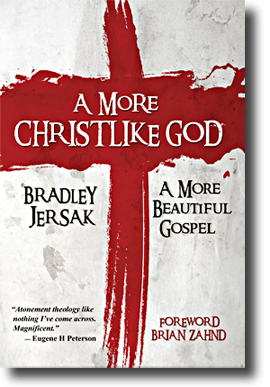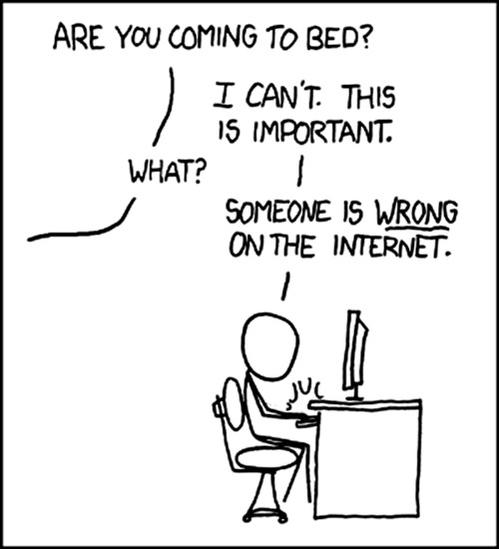We Christians have our own language. Some call it Christianese. Others call it just plain creepy.

Liberating you from bad ideas about God
Stop relying on pastors and Bible teachers to tell you what the Bible means.
Read this book and learn to study the Bible for yourself. Available now on Amazon.
The book discussion questions with each chapter to make it perfect for a home study group. There is also a LONG appendix on how to understand the violent passages in Scripture.
A man I work with recently asked if I had received an email from another coworker. I told him no, I had not. He said this, “I’m not calling you a liar, but …”
I cut him off and said, “Yes, you are! You cannot say you are not calling me a liar, and then proceed to challenge the truthfulness of what I just said. The word ‘but’ negates everything that came before it.” I offered to let him view my email account just so he could see that I was not lying. He declined and left my office.
The word “but” is an amazing word. We use it all the time to say contradictory things.
In fact, almost any time you hear someone say “I’m not ________, but …” you can almost guarantee that whatever follows the “but” will be the exact opposite of what preceded it.
The phrase “I’m not a racist, but …” will always be followed with a racist statement.
The phrase “I don’t hate gays, but …” will always be followed with a homophobic statement.
The phrase “I know God loves everybody, but …” will always be followed by a statement that maybe God doesn’t love everybody.
The phrase “I hope this doesn’t come across as heartless, but … ” will always be followed by a statement that is heartless.
One phrase I hear a lot from people is this one:
“I believe in grace, but …”
Such a statement will always be followed by a statement which shows the person does not believe the first thing about grace.

Pastors and Christian Bible teachers are notorious for giving confusing messages about grace. We preach that God loves people unconditionally, that Jesus will never leave us or forsake us, that we can come to God just as we are, and that nothing can separate us from God’s love. This is well and good.
Then we often follow up this teaching with the impression that maybe there are conditions to God’s infinite love, that maybe Jesus will forsake us, and that God doesn’t want us exactly as we are, and that there are some things that will separate us from the love of God.
I call this adding “buts” to grace.
This occurs whenever we say something like,
“Grace is free, but…”
“God forgives all our sins, but…”
“God loves you unconditionally, but…”
“God will never leave you nor forsake you, but…”
“Eternal life is by faith alone, but…”
You see?
These “buts” completely negate whatever came before it.
So stop adding buts to your theology.
Grace has no but, and neither does love, mercy, and forgiveness.
Those who add buts to grace do not know God or His grace. There are no conditions or limits to grace. Grace is infinite and free. Period.
My neighbor’s name is Carissa. She is twenty-one years old. And she is beautiful.
But she has a very … strange relationship with her boyfriend. His name is Kirk. It is not that Kirk is abusive … not really. I suppose you could say he is controlling and manipulative, but I don’t even know if that is exactly accurate. Something just seems “off.”
He wants to know where she is at all times, even though she hardly ever knows what he is doing most of the week.
He demands to know where she spends her money, and also requires that she contribute a portion of her money to their “date fund.”
Their “dates” are really something closer to appointments. They go on one date per week, from 7:00-9:00 PM every Friday night. If she is late or has to cancel, Kirk wants to know why. If she doesn’t wear the right clothes on their dates, he chides her for not looking her best. He constantly reminds her that if she wants their relationship to work, these dates are critical.
But they do the same thing every week for their date. He picks her up at 7:00 sharp. They listen to music on the way to a restaurant. He only lets her pick from 20 “date approved” songs. And they go to the same restaurant every week. He orders food for her without asking what she wants. What he orders varies from week to week, and while it is occasionally the cheapest thing on the menu, it is never the most expensive.
During the meal, he asks her how her week was, but doesn’t listen to her answers. He does most of the talking. When the meal is over, they go for a walk around a local park while holding hands. Then, at 8:50 PM they get back into their car so that he can drop her off at her house by 9:00 sharp. He gives her a kiss on the cheek and says, “I’ll see you next week! And remember, I’ll be thinking about you all week long.”
That’s their date.
During the week, Kirk sends her emails and text messages, but they all sound identical to the ones he sent last week. “I’m thinking about you!” he texts. “Can’t wait to see you this Friday! How’s your week going?” But when she texts back, he never replies.
I could go on and on about this strange relationship Carissa has with her boyfriend.

But last week something happened …
This relationship has been going on for several years now, and I have gently tried to tell her that she should dump this guy and look for a new boyfriend. She always says that I don’t understand what they have together. That their relationship is fine. That he loves her and she loves him.
But last week, as she told me how great her relationship was, I must confess I got a little upset.
I said to her, “You could do so much better! You are young, beautiful, creative, talented! There is so much you could do. So much you could experience! So much of life you are missing out on! This guy Kirk … I don’t know what his deal is … but he is not right for you! He doesn’t really care about you, despite all his lame texts and empty emails and pointless dates. He apparently just likes to show your picture to his friends and say, ‘That’s my girlfriend.’ But that’s not a relationship! Get out! Leave him! I hate this guy. I hate what he does to you! He is not good! He doesn’t make you shine! He doesn’t honor you, respect you, or treat you like the princess you are! He does not love you. He is only using you.”
And do you want to know what Carissa said to me?
She looked at me with sort of a shocked, hurt, confused look on her face, and she said, “You sound angry … Are you bitter about a bad relationship from your past? … Why are you so critical of my boyfriend?”
I was stunned.
Angry? Bitter? Critical?
I don’t want to be any of those things …
Was she right?
I do often get upset at things when I shouldn’t. And I have had rocky times in my past relationships. My marriage isn’t perfect. And could it be that I was frustrated at my own failures as a husband and was unfairly and critically projecting these onto her boyfriend?
Maybe I should just back off and raise up my hands and say, “You’re right. I’m sorry. I know very little about your relationship. I wish the two of you all the best.”
But then I realized something.
If Carissa were my daughter, would I feel any different?
No! In fact, my love for my daughter would only amplify my feelings. If Carissa were my daughter, I would absolutely, definitely, be angry, bitter, and critical. Love would demand that I be angry, bitter, and critical.
Why? Because my daughter deserves better! Since I love her, I am required to fight for her. To hate how she is being treated. To be bitter that some jerk is treating her like trash. My love for her requires me to be critical of him, his ways, his tone, his attitude, and his complete lack of genuine love for my daughter.
So absolutely I was angry! Angry about a fake relationship that was passed off as the genuine thing!
You better believe I was bitter! Bitter that someone else’s daughter was getting treated so callously!
And of course I was critical! Someone needed to be critical of this guy so that hopefully Carissa would see that how she was being treated was not right and that she deserved so much better!
I told her these things, but she didn’t hear them. She was convinced that she knew better and that my “anger, bitterness, and critical spirit” were causing me to only see the bad things in her deadbeat boyfriend.
She admitted that her boyfriend and her relationship with him wasn’t perfect, but said, “There’s no such thing as a perfect relationship.”
“That’s true,” I told her. “But there certainly are better relationships than the one you’ve got.”
“I used to think so too,” she replied. “But now I realize that those sorts of relationships are only in movies and books. We all long for those sorts of relationships, but the sooner we realize they don’t actually exist, the better off we’ll be.”

I understand where she is coming from. I do. I was in bad relationships when I was young, and nobody else could tell me they were bad. I had to come to that realization on my own.
And like her, I believed that there were no relationships like the ones in movies and books. But I have also started to see in my marriage to my own wife, that unless you believe that your relationship can get better, and work toward that goal, it will only get worse.
So I trust that Carissa will soon learn that her boyfriend is not good for her. I hope that she will leave him and will find the relationship she longs for her in her heart but doesn’t believe actually exists.
I hope she will eventually learn to see that although I was angry, bitter, and critical, it was only because I loved her, and wanted something better for her than what she has.
 … By the way, this entire story was a parable.
… By the way, this entire story was a parable.
I do not have a neighbor named Carissa. I don’t even know anyone named Carissa.
But I do have a neighbor named “Christian.”
… And she has a boyfriend named “church.”
This post was part of the May 2015 Synchroblog on the topic of anger. Here are other contributors to this month’s topic:
Earlier this week I wrote a LONG post about the place of the Mosaic Law in the life of the Christian. It was over 6000 words. Yikes! Here is something a little more light-hearted, but still on the same topic.

Jose A. Torres Flores posted the following on my Facebook page recently in response to a post that got a lot of … Pharisaical … religious … passionate comments.
I liked it so much, I asked if I could post it on my blog. It turns out, the original post belongs to Mick Mooney. Go check it out here. Below is what he wrote:
Once upon a time, a mother made her son a wristband. On it was written: WWJD. This, of course stood for: What Would Jesus Do?’ She instructed her son to look at the wristband before making decisions on how to live his Christian life.
A week later she was shocked to see that her son had become friends with prostitutes, was hanging out with ‘sinners’ – even buying people who were already drunk yet another round of beers!
 Worse still, he had walked into their church the previous Sunday and tore down the book store, overturned the tables and threw the cash register through the window, he then made a whip and chased the pastor out of the building, declaring he was turning God’s house into a den of thieves.
Worse still, he had walked into their church the previous Sunday and tore down the book store, overturned the tables and threw the cash register through the window, he then made a whip and chased the pastor out of the building, declaring he was turning God’s house into a den of thieves.
Most shocking was what happened when his mother went to picket the local abortion clinic. To her embarrassment, her son was also there, but he was standing with the women who just had an abortion, and yelled at the protesters: “You who is without sin, throw the first stone!”
The mother was very distressed, but fortunately she found a solution to this terrible problem. She made another wristband, this time it read: WWAPD, this, she explained to her son, stood for: What Would A Pharisee Do? She took the old WWJD wristband and burned it.
Since her son has been wearing the new wristband, looking at it to help him make his decisions, he has become a dedicated tither, a public prayer warrior, an active condemner of ‘sinners’, a passionate defender of the Old Covenant law, and has a great reputation as a godly young man amongst other religious people.
Needless to say, the mother is very happy now. She only wishes Jesus would take notice and follow her son’s good example.
Recently I wrote a post on the All About Eve blog that the theological invitation “Believe in Jesus for eternal life” is more concretely summed up with the statement “God loves you.”
I wrote that many people have trouble understanding what it means to believe in Jesus for eternal life. And while this invitation is referred to over and over in the Gospel of John (e.g., John 3:16; 5:24; 6:47), this offer of eternal life is often equated with the fact and foundation of God’s love for humanity.
So I believe that if we really understand God’s love for us, we will have also understood that He gives us eternal life freely through Jesus Christ.
Therefore, when someone says, “I don’t know if I have believed enough, or believed the right thing,” one way to help people sort through this is to ask if they know that God loves them.
 And I mean REALLY loves them. No conditions. No limits. No ifs, ands, or buts.
And I mean REALLY loves them. No conditions. No limits. No ifs, ands, or buts.
This sort of understanding of God’s love is so radical, it revolutionizes everything we think about God, Scripture, ourselves, and the church.
Understanding that God loves you infinitely and completely no matter what you have done in the past or what you do in the future, whether you change or not, this is equivalent to understanding that God gives you eternal life freely by His grace.
This sort of teaching about love is what grants people freedom from sin, freedom from religion, and freedom from fear.
I have previously written about this on numerous posts in numerous ways.
But here’s the thing that I have come to realize in the last couple of days:
The church has bastardized the biblical concept of love.
I doubt you could find a church in the world which does not preach the message that “God loves you.” But so few churches and Christians actually understand it or believe it.
Yet rather than try to fight this misunderstanding about love, I think might be best to start saying something else instead.
Rather than saying “God loves you” to people, maybe we should start saying “God likes you.”
Yes, yes, I know. “Like” is a much weaker word than “love.” But there are countless millions of people who would agree in a second that God loves them, but who do not for a second believe that God likes them.

To understand what I’m talking about, let’s back up a bit. In Christian circles, it is not uncommon to hear someone say this: “I love my neighbor … but I don’t like them.” Or maybe instead of your neighbor, you have said this about an in-law, the church gossip, or a rude deacon.
When we say we love someone but don’t like them, we mean this: “I love them (because I know I am supposed to), but I don’t want to hang out with them or be their friend.”
This sort of idea is often preached in our pulpits as well. Again, you will sometimes hear pastors say this: “As Christians, we are supposed to love everybody, just as God loves us. But even though you love them, you don’t have to like everything about them. Remember, we love the sinner and hate the sin!”
Do you see? We have this attitude toward others because we think this is God’s attitude toward us. We think God loves us, but doesn’t really like us. At least, He doesn’t like us the way we are now. He likes some future version of us where we have cleaned up our lives, gotten rid of sin, read our Bibles and pray more faithfully, and witnesses regularly to our friends and neighbors. That future “fixed” person is the one God wants to be friends with and hang out with; not the “broken” and sinful person we are now.
So you see? Though we believe God loves us, we don’t really think He likes us.
But here is the Gospel truth as revealed in Jesus Christ: GOD LIKES YOU!
Let me bring this down to earth a little bit more.
Think of a famous author, actor, or musician you would love to be friends with.
For me, I think of people like N. T. Wright, Brad Paisley, and Keanu Reeves. I think it would be awesome to be best friends with these guys. You know … to have such a good friendship that it became informal … that they just drop by my house to see what’s going on, and I could do the same for them. It would be assumed that we watch football together on Monday nights. That when we went camping, we would invite the other along. That if we just wanted to chat about life and theology, we would call up the other person first.
Do you have someone in mind who is like that? Someone you would love to get to know, hang out with, and have “inside jokes” with?
 Usually, when we think about God, we tend to put God in the place of these famous people we want to know. We think, “It would be so cool if God and I were on a first-name basis. If I could call God any time I wanted. If we could hang out like best friends.”
Usually, when we think about God, we tend to put God in the place of these famous people we want to know. We think, “It would be so cool if God and I were on a first-name basis. If I could call God any time I wanted. If we could hang out like best friends.”
But here is the actual truth: When God thinks about you, He thinks about you the way you think about the famous people you want to know. The way I think about being friends with N. T. Wright, Brad Paisley, and Keanu Reeves, that is how God thinks about me.
God likes me so much, He dreams about being on a first-name basis with me! He dreams about hanging out with me to watch a football game. He dreams about just showing up at my house with no other purpose than to say, “What’s happening?”
And this is the same way God feels about you.
More than anything else, He wants to hang out with you. He wants to be your friend. You are the famous person He would “name drop” to all the angels when He talks about what He did over the weekend. More than anything, God wants to be on a first-name basis with you. He wants to be the one you think of calling when things are going great, and the one you call when things are going bad.
God likes you so much, He wants to even hang out with you when you are weeding your garden, filling your car with gas, and running errands to Sears.
And best of all, God likes you just as you are. He doesn’t want to be friends with some “better and improved” version of you. He wants to be friends with you … as you are right now.
This is the truth about God that many people do not believe and cannot accept. They cannot believe that the God of the universe is so madly in love with them, so infatuated with them, so in awe of who they are and what they like and the sorts of things they do, that He would “like” every single one of your Facebook posts, would “Favorite” every single Tweet, and would “Repin” every single picture on Pinterest.
God is your biggest fan, and He dreams of just being in your presence.
God likes you.
This is the Gospel message. This is what Jesus came to reveal.
Do you believe this?
Christians are always encouraged to become more “Christlike.”
But we rarely do.
Or at least, not to any significant degree.
Over the centuries, pastors and theologians have proposed dozens of explanations as to why this happens. Some say we just need to be more “filled with the Spirit.” Others say that the problem is that people who don’t live like Christians were never really Christians in the first place, and they won’t be until they truly “get saved.” A few proclaim that the problem is a lack of Bible knowledge, and that if we can just “renew our minds” with the Word of God, renewed lives will follow. And on and on it goes.

Can I propose something radical?
Maybe the reason many Christians are not very Christlike is because the God we worship is not very Christlike.
In the minds of most Christians, God is sitting in heaven with His arms crossed and a scowl on His face about all the sin in our lives. In the minds of most, the primary activity of God is to judge sin, point out our failures and weaknesses, and decide who is truly righteous enough to be part of His family.
He is controlling to the point of determining who lives and who dies, and He is to blame for tsunamis, earthquakes, diseases, famines, and wars.
He manipulates countries, pulls strings to govern human affairs, and demands the people follow and obey Him “or else.” And although He says He loves humanity, He does not seem to like us very much. At least, not until we fix ourselves up a bit. After all, “God cannot even look upon sin. He loves the sinner, but hates the sin.”
And since humans become like what we worship, when we worship this God who doesn’t look much like Jesus, we become more like God and less like Jesus.
Just like God, we sit around with our arms crossed and a scowl upon our faces at all the sin in other people’s lives.
Just like God, our primary activities seem to include judging sin, pointing out the failures and weaknesses in others, and deciding who is truly righteous enough to be in God’s family.
Just like God, we seek to control the lives of others, telling them what they can and cannot do, can and cannot believe.
And since our God seems to be at war against “wicked people,” we feel it is our duty and responsibility to also wage war against people we think are “wicked.” You know, the Muslims, the gays, and the abortion doctors.
Just like God, we try to manipulate rulers and leaders to do what we want. We try to pull the strings behind the scenes to get others to follow our ideas and our teachings.
And just like God, while we say that we love everybody, we don’t seem to like other people very much. We do not hang out with “sinners,” because they might pollute us. We say that we “love the sinner, but hate their sin.”
We have become images of the God we worship.
And since our God is not very Christlike, neither are we.
But in recent decades, a growing number of people are beginning to see what it really means for Jesus to be God incarnate.
An increasing number of people are beginning to recognize that one of the primary reasons Jesus came was to reveal God to us.
People are beginning to see that Jesus is not like God; God is like Jesus.
And God has always been like Jesus. God has always been with us and among us, sharing our pain, taking our blame, and redeeming our shame. He heals, He comforts, He restores. He hates nobody, kills nobody, and condemns nobody. He knows all, loves all, and forgives all.
And though many among Western Christianity are just now coming to understand that Jesus reveals God to us, this view is not new. It was the dominant view of the church for over 1000 years, and has always been the view of Jesus in Eastern Christianity. It is only in the West, where we allowed economics and empire to guide our theology, that God came to look more like a king on a throne than Jesus on the cross.
But that is all changing now, and I cannot wait to see what happens in the church and in the world as a result.

To become more Christlike ourselves, we need a more Christlike God, and to see a Christlike God, we simply need to look at Jesus.
And when we look at Jesus, and recognize the truth … that He is the image of the invisible God (Col 1:15) and the exact representation of God (Heb 1:3), we will discover that we start to become more Christlike as well.
We will bless those who curse us.
We will pray for those who persecute us.
We will serve those who wish us only harm.
We will love those who seek violence against us.
We will hang out with those that religious people label as “sinners.”
We will see all people as our brothers and sisters, rather than just those who dress like us and believe like us.
We will no longer judge and condemn others, but will freely forgive them instead.
And we will do all these things because this is how Jesus treated others and how our Heavenly Father treats us.
When we see that God is Christlike, we will become Christlike as well.
Jesus does not look like God; God looks like Jesus.
Let me explain what I mean.
For far too long, Christian theology has allowed a domineering monarchial view of God to discolor and distort our perspective of Jesus. We have an idea of God as the Sovereign King of the universe sitting on His throne in heaven, ruling the poor masses below through sheer power and control. And we have often interpreted Jesus in light of that picture of God. God, up there on His throne, is angry at us for how we rebelled against Him, and so Jesus has come to appease the wrath of God against humanity, which He does by dying on the cross.
Of course, Jesus has a dark side too, and at the end of time, when Jesus comes again, the bloody side of God will be on display in all its glory when Jesus lays waste to the world. So apparently, God is still angry at us, and although the death of Jesus calmed God down for a while, eventually even Jesus gets sick of all the sin, and decides God was right after all.
So you see? We have understood Jesus in light of God.
Thankfully, in recent decades, many pastors, theologians, and authors have begun to challenge this idea of Jesus (and God). Their idea is not new, but is as old as the church itself, and has always been the dominant view of Eastern Christianity. The view is that humanity has been mostly wrong about what God is like, so Jesus came to reveal God to us. Jesus does not look like God; God looks like Jesus.
As we in the West have rediscovered this truth once again, many people are publishing books about it. In recent years I have read dozens of excellent books on the topic. Books by people like C. S. Lewis, N. T. Wright, Walter Wink, Derek Flood, Greg Boyd, and numerous others, have been helpful guides in helping me see that God is Christlike.
 One of the most recent books I have read on this subject is the new book by Bradley Jersak, A More Christlike God. I love the title, because it makes one realize that many theologies portray a God who is not very Christlike at all. He looks more like Zeus or The Terminator. But in A More Christlike God, Brad Jersak helps us see that God looks like Jesus.
One of the most recent books I have read on this subject is the new book by Bradley Jersak, A More Christlike God. I love the title, because it makes one realize that many theologies portray a God who is not very Christlike at all. He looks more like Zeus or The Terminator. But in A More Christlike God, Brad Jersak helps us see that God looks like Jesus.
Jersak begins his book with several chapters which show how the un-Christlike view of God developed and is taught in Western Christianity. Then, beginning with the concept of self-emptying of God (kenosis) in Philippians 2, he shows how the New Testament paints a portrait of a God who is non-violent, fully loving, self-sacrificial, and completely forgiving.
Jersak’s defense of a Christlike God centers around something he calls “Divine Consent.” The idea is that just as Jesus emptied Himself of His power and position so that He might better love and serve humanity (Philippians 2), so also, God has been emptying Himself of His power and position since creation so that He also might love and serve humanity. One of the ways God did this is by giving humans a degree of genuine freedom. This means, of course, that we might use this freedom in ways God does not want. God could, of course, use His power to stop us from using our freedom in ways He does not want, but then our freedom would not be free. So God empties Himself of His power, and His right to control us, and consents to our misuse of His gift of freedom.
Yet because God knows that our misuse of His gift of freedom results in death and destruction, God doesn’t just say, “You’re going to regret that decision.” Instead, He jumps into the catastrophic consequences of our bad decisions, and works with us to bring hope, healing, restoration, and redemption from the pain and suffering caused by sin. Brad Jersak calls this “Divine Participation.”
 One of the key sections of A More Christlike God is where Brad Jersak discusses the all-important issue of “the wrath of God.” This idea is found in numerous places in the Bible, and is one of the key issues in this debate about what God is like. Many people assume that the phrase “the wrath of God” indicates that God is angry at us. Jersak presents a compelling case for why this is not a proper understanding of that term. He rightly critiques the idea that “the wrath of God” is God withdrawing His mercy. God never withdraws His mercy. God’s mercy is unfailing and everlasting. His mercy endures forever (Psalm 136).
One of the key sections of A More Christlike God is where Brad Jersak discusses the all-important issue of “the wrath of God.” This idea is found in numerous places in the Bible, and is one of the key issues in this debate about what God is like. Many people assume that the phrase “the wrath of God” indicates that God is angry at us. Jersak presents a compelling case for why this is not a proper understanding of that term. He rightly critiques the idea that “the wrath of God” is God withdrawing His mercy. God never withdraws His mercy. God’s mercy is unfailing and everlasting. His mercy endures forever (Psalm 136).
Instead, Jersak defines the wrath of God as “God giving us over” the destructive consequences of our own decisions. As we all know, decisions have consequences. While God seeks to protect us from the consequences of sin through Scripture, wise counsel of friends, and the indwelling Holy Spirit, if we continue down the path of sin and reject His many gifts of mercy, there comes a point where God’s divine consent to our willful rebellion requires Him to let us face the consequences of our decisions.
The book closed with an interesting way of explaining to others the two primary ways of understanding God in the Bible and what Jesus accomplished on the cross. To show this visually, Brad Jersak and Brian Zahnd put together a YouTube video called “The Gospel in Chairs.” Here it is:
Since this video contains the sort of perspective found in this book, I highly recommend you read A More Christlike God.
My only real complaint is that A More Christlike God does very little to help the reader understand the violent texts in the Old Testament. He makes a minor statement on page 17 (through the words of a teenager girl named Jess) that the violence in the Old Testament is not what God did, but only describes what the people thought He was doing. I would have really like a fuller explanation of this idea, especially in how this idea relates to inspiration and inerrancy of Scripture.
To be clear … I AM MAKING FUN OF MYSELF HERE. The following comic strip is ME from last Sunday night.
Hat tip goes to Richard Jacobson. Check out his blog and follow him on Twitter.

On Sundays, I sometimes like to post a light-hearted little comic strip that I found humorous. Last week I posted a comic strip I thought was both light-hearted and insightful. Some people thought it was neither …
In my opinion, people completely misunderstood what I had posted and why. But whatever. Such is life on the internet, where everybody is wrong except me…
